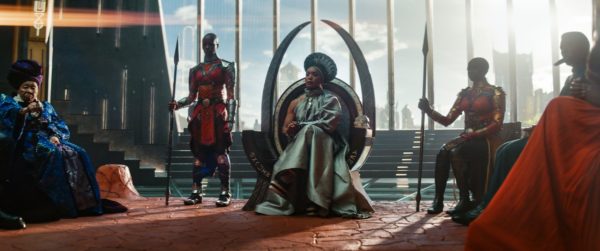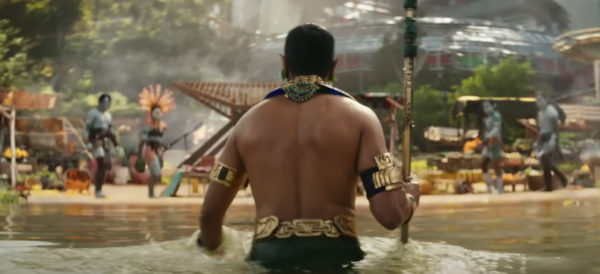
There’s a burning question at the center of the latest MCU entry, Black Panther: Wakanda Forever: how to move forward without T’Challa / Chadwick Boseman?
The Marvel Cinematic Universe has never faced a situation quite like the tragic death of Boseman. When the actor died unexpectedly in 2020, the fate of future iterations Black Panther – the mega popular Phase 3 entry and the only film headlined by a Black actor – were suddenly called into question. Rather than recast the role, writer/director Ryan Coogler opted to follow the path of the comics, which found T’Challa’s gifted younger sister Shuri (Letitia Wright) take over the super hero mantle.
Wakanda Forever spends the bulk of its supersized 161 minute runtime mired in grief, anger and indecision. The film is equal parts tribute to the actor and the character, and works best when the characters are grappling with the absence of the man who held everything together.
The film also wisely gives increased screen time to Shuri and Queen Ramonda (Angela Bassett), who effectively take over as leads. Following a brief opening sequence wherein T’Challa succumbs (offscreen) to a sudden medical condition (echoing Boseman’s real life undisclosed battle with colon cancer), the action jumps ahead one year.
As Shuri locks herself away in the lab and refuses to work at recovering the heart-shaped herb that transforms Wakandans into the Black Panther, Ramonda is contending with political unrest on the world stage. At the UN, diplomats from the US and France berate Wakanda for hoarding Vibranium, even as they attempt clandestine military ops to steal it for themselves.
The focus on resources is one of several real-world political issues Wakanda Forever draws on for its central plot. The American government is using a new vibranium-seeking machine on the ocean floor in an effort to level the playing field, but the discovery of a stash incites violence when the mining station is attacked and its employees (including Lake Bell in a cameo), are killed by a mysterious group of super powered aquatic individuals from Taloka.
Fearing the discovery of their underwater society, the Talokans, led by Namor (Tenoch Huerta), move quickly to eliminate the scientist who built the machine: brilliant graduate student Riri Williams (Dominique Thorne). As the only other nation with access to Vibranium, Namor calls on the Wakandans for assistance, suggesting an alliance built on their mutual isolationist political stance.

The political commentary of the narrative isn’t subtle, although it is murkier and less satisfying than Killmonger (Michael B. Jordan)’s rationale for waging war in the first Black Panther. Here there’s an explicit acknowledgement that imperial super powers, represented by white Americans like the head of the CIA Valentina Allegra de Fontaine (Julia Louis-Dreyfus) and an unwilling Agent Ross (Martin Freeman), will plunder and pillage developing countries (ie: POC in Africa and South America) for natural resources and increased wealth.
This plays better than Namor’s unrelenting belief that killing Riri will prevent Talokan from discovery, which is an unpersuasive motivation and hardly befitting the scope of the conflict to come. It’s aggravating because Coogler and co-screenwriter Joe Robert Cole do such great character work, particularly in the simmering aggression between Ramonda and Shuri, and the lengthy middle section when Shuri bonds with Namor after she’s kidnapped. Huerta, Wright and Bassett are all doing truly work selling the human drama that dominates the vast majority of the film’s runtime.
Yes, there are action sequences, including a car chase through the streets of Boston, a watery attack on the Wakandan capitol, and the usual MCU pixel-porn climatic battle. The finale, however, which pits the Wakandans, including Nakia (Lupita Nyong’o), Dora Milaje General Okoye (Danai Gurira) and Jabari leader M’Baku (Winston Duke) against the Talokans on a giant ship in the middle of the ocean, lacks the gravitas and emotional investment of the best MCU films, in part because the real stakes lie in the more intimate confrontation between Shuri and Namor elsewhere.
The cross-cut climax, along with the extra long runtime, robs the film of a great deal of its power. The reality is that these characters are rich enough to entertain when they’re contending solely with political machinations and heartfelt talks; Black Panther works best when it is a drama focused on grief and loss. It’s when Kevin Feige’s Disney/MCU machine steps in to demand CGI action that the film becomes just another entry in the franchise’s multi-phased plan.
It’s not bad, but it’s a bit of a shame because Basset, Wright and Huerta deserve better. 4/5
Black Panther: Wakanda Forever is now in theaters